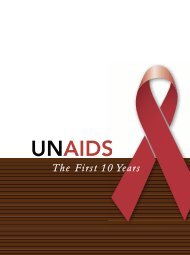Task Shifting - Global Recommendations and Guidelines - unaids
Task Shifting - Global Recommendations and Guidelines - unaids
Task Shifting - Global Recommendations and Guidelines - unaids
Create successful ePaper yourself
Turn your PDF publications into a flip-book with our unique Google optimized e-Paper software.
ANNEX 3<br />
Annex 3<br />
Methodology<br />
The recommendations <strong>and</strong> guidelines on task shifting were developed based on the existing<br />
evidence that is available in both peer-reviewed literature <strong>and</strong> in “grey” literature such as policy<br />
documents <strong>and</strong> reports. These sources were complemented by evidence gathered through<br />
specifically commissioned studies in seven selected countries that had different degrees of<br />
experience in task shifting. The evidence gathering was informed <strong>and</strong> guided by a wide range of<br />
experts <strong>and</strong> stakeholders <strong>and</strong> by a number of selected countries that were already implementing<br />
a task shifting approach to varying degrees. The evidence was reviewed by a panel of experts<br />
over a period of one year at a total of nine international consultations. The final text of each of the<br />
recommendations is based on the consensus that was reached.<br />
The steps in the process between January <strong>and</strong> December 2007 can be summarized as follows:<br />
1. Identification of the needs <strong>and</strong> scope<br />
2. Development of partnerships <strong>and</strong> technical collaborations<br />
3. Review of peer-reviewed <strong>and</strong> “grey” literature<br />
4. Gathering of expert opinion<br />
5. Identification of evidence gaps<br />
6. Additional research in countries<br />
7. Drafting, review <strong>and</strong> revision of the recommendations <strong>and</strong> guidelines<br />
The activities undertaken at each of these steps is described in detail below.<br />
1. Identification of needs <strong>and</strong> scope<br />
At the outset, in late 2006, WHO undertook an initial preparatory process of country consultation.<br />
This involved a series of country visits to Ethiopia, Haiti, Malawi, Namibia, Rw<strong>and</strong>a <strong>and</strong> Ug<strong>and</strong>a,<br />
where multisectoral meetings were held to consult relevant stakeholders about their knowledge<br />
<strong>and</strong> opinions on the task shifting approach <strong>and</strong> their own identification of the needs <strong>and</strong><br />
challenges involved. This helped to identify the themes that needed to be addressed by the<br />
recommendations <strong>and</strong> guidelines on task shifting. It also established, from the start, that the<br />
development of the recommendations <strong>and</strong> guidelines would be a process led by countries with<br />
direct experience of implementing the task shifting approach to increase access to HIV services.<br />
The themes were further defined in consultation with a selected number of technical experts on<br />
HIV <strong>and</strong> human resources for health <strong>and</strong> with other stakeholders, including government<br />
representatives from HIV programmes <strong>and</strong> human resources for health departments from health<br />
ministries; representatives from other ministries, such as education <strong>and</strong> labour; regulatory bodies;<br />
United Nations agencies; donors; health workforce representatives, including professional<br />
associations <strong>and</strong> unions; academic institutions; civil society organizations; <strong>and</strong> representatives of<br />
people living with HIV/AIDS.<br />
On the basis of the experiences of the participating countries <strong>and</strong> an initial review of the evidence<br />
available in the published literature, those who were involved in the consultation process identified<br />
the issues that would need to be considered by countries wishing to adopt, or extend, a task<br />
70

















